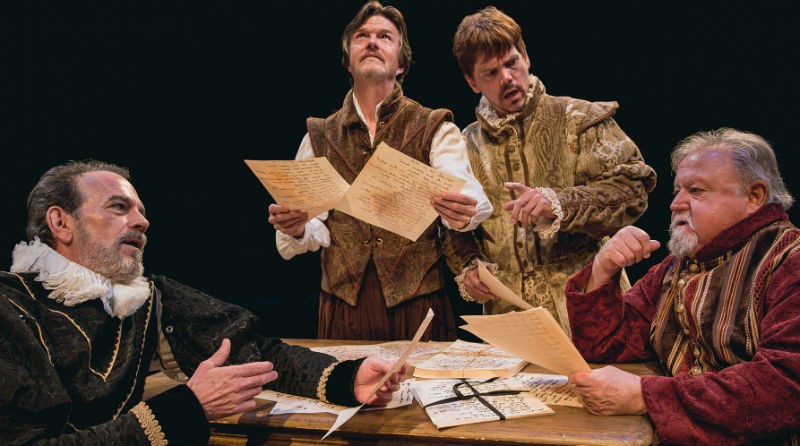The world almost didn't have many of the works of William Shakespeare. Back in the last part of the 16th and early 17th Century (and for a long time after), playwrights weren't quite so scrupulous about keeping copies of their original works. And then there was the small matter of the Globe Theatre burning down in 1613.
After Shakespeare died, several versions of his plays were traveling about the theater world, with distinctly varying levels of authenticity. Based on real life events, The Book of Will by playwright Lauren Gunderson is the story of how friends of Shakespeare and actors in his company got together to assemble the first folio of his work, trying their best to get to the words he wrote.
"It's almost like a thriller. We could have lost all of this," says Rebecca Greene Udden, artistic director of Main Street Theater, who is directing the play that she had been trying to secure the rights to for a while. About half of Shakespeare's plays had been published but the others had not, she said. "Some of them would have been lost. Or they could have been published in such wretched versions that we wouldn't have liked them."
Despite what could have been very serious consequences, the play itself is a comedy, Udden says.
"It’s a comedy with serious intent. It’s fun; it’s a joyful play. This effort was so personal for the company that put it together. We don’t have transcripts we don’t have a lot of documentation of what actually happened. But the story is just so joyful. The bones of the story are true."
According to Udden, the company paid Shakespeare for his work and he did not keep the rights to it. Actors wouldn't get the complete script, just the parts that had their lines on it, she said."The prompter had a full copy and the theater had a full copy. There was a guy who spent his time writing out people's parts."
Part of this was due to the cost of paper and the other part was they didn't want other theaters and companies stealing their work, she says. "People did steal their work but they wanted to make it harder for people to actually get the play." Which was a significant concern because whoever published first had the rights to publishing the plays, she says. The acting companies had the rights to perform the plays.
"The guys that printed a lot of the early quartos, they would send people into the theater to write plays down as they were being performed. Of course the accuracy of those things was not very true. The first folio is the most accurate that they could get."
So in essence, this group trying to save Shakespeare's work "did have to kind of piece it together from scraps because they'd lost so much of the original scripts by the time they got around to publishing this," Udden says. "Nobody had all the copies of all of the plays."
There are 11 actors in this two-act with some taking multiple roles. Women are important in this story as well, Udden says, because they were the ones who really prodded the men to get this folio completed. "The women were at the theater selling fruit and pouring ale so they learned the plays too."
"It's just a wonderful story and the fact that it could have not happened. That just astonished me. The world's greatest playwright might not have been remembered."
Performances are scheduled for September 22 through October 21 at 7:30 p.m. Thursdays, Fridays and Saturdays and 3 p.m. Sundays at Main Street Theater - Rice Village, 2540 Times. For information, call 713-524-6706 or visit mainstreettheater.com. $36-$48.
Support Us
Houston's independent source of
local news and culture
account
- Welcome,
Insider - Login
- My Account
- My Newsletters
- Contribute
- Contact Us
How Shakespeare's Work Was Saved For All Time in The Book of Will

Photo by RicOrnelProductions
L-R Ben Jonson (John Feltch), John Heminges (Joel Sandel), Henry Condell (Dwight Clark) and Richard Burbage (Rutherford Cravens)
[
{
"name": "Related Stories / Support Us Combo",
"component": "11591218",
"insertPoint": "4",
"requiredCountToDisplay": "4"
},{
"name": "Air - Billboard - Inline Content",
"component": "11591214",
"insertPoint": "2/3",
"requiredCountToDisplay": "7"
},{
"name": "R1 - Beta - Mobile Only",
"component": "12287027",
"insertPoint": "8",
"requiredCountToDisplay": "8"
},{
"name": "Air - MediumRectangle - Inline Content - Mobile Display Size 2",
"component": "11591215",
"insertPoint": "12",
"requiredCountToDisplay": "12"
},{
"name": "Air - MediumRectangle - Inline Content - Mobile Display Size 2",
"component": "11591215",
"insertPoint": "4th",
"startingPoint": "16",
"requiredCountToDisplay": "12"
}
,{
"name": "RevContent - In Article",
"component": "12527128",
"insertPoint": "3/5",
"requiredCountToDisplay": "5"
}
]

